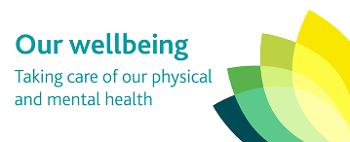Talking helped me take back control—Martin's wellbeing story
Talking about Coeliac disease, finding support and raising awareness.
 Soft facilities management officer, Martin Waterston, says when he was diagnosed with coeliac disease (pronounced see-liac) at age 33, it proved to be a positive turning point in his life. Talking about how gluten affects his body and the negative impact on his mental health, led him to the help and support he needed.
Soft facilities management officer, Martin Waterston, says when he was diagnosed with coeliac disease (pronounced see-liac) at age 33, it proved to be a positive turning point in his life. Talking about how gluten affects his body and the negative impact on his mental health, led him to the help and support he needed.
Getting that official diagnosis, along with key information, resources and the right support at work, enabled Martin to take back control and live a healthy, happier lifestyle.
Now, Martin uses his experience to help other and he's had a real impact among his colleagues who can see, first-hand, the power of opening-up about wellbeing and a supportive culture at work.
Assistant facilities manager, Darren Barnes, explained: "Many people don't realise the impact that coeliac disease has on people's lives and how it can affect them at work. But Martin has so much passion and talks so openly about the subject, that he's really opened our eyes and helped us gain a deeper understanding. He's always happy to chat with anyone who needs support or is just interested, and he continues to be an inspiration to us all".
Martin's story
"Taking the plunge to admit I was struggling and to find out what was wrong with me was a bit scary. But ultimately it helped me find the answers and support I needed. Learning that my body needs a gluten free diet and making that switch has changed my life completely.
"The level of support and understanding from my Soft FM team and line managers, has really helped me adjust to my new lifestyle and they are always encouraging when it comes to sharing my story and raising awareness.
"It still amazes me to think that one person in every 100 will have coeliac disease and that this rises to one in 10 when it's already in the family. But despite it being so common, only around 36% of people who have it, know they have it.
"I no longer struggle with daily bloating, stomach pains and hunger pangs, but what shocked me most was how symptoms like fatigue, low mood and brain fog all began to melt away once I made the right changes to my diet.
"That's why I'm committed to sharing my experience and helping others identify the symptoms that they might not realise could be linked to coeliac disease.
"I do still feel anxiety when eating food that someone else has prepared, because the tiniest bit of cross-contamination can lead to days of pain for me. So, it really helps that I'm supported at work. My team have made a big effort to learn about the disease and they do all they can to make sure I always feel safe and supported—like tracking down gluten-free sandwiches just for me on training days. It's great to be able to be open about this and feel confident to share my experience."
 We are grateful to Martin for talking to us and we hope his story will inspire colleagues across the council to pay attention to their own health needs and not be afraid to talk about wellbeing or ask for support when they need it.
We are grateful to Martin for talking to us and we hope his story will inspire colleagues across the council to pay attention to their own health needs and not be afraid to talk about wellbeing or ask for support when they need it.
For more on Coelic disease, visit the Coelic UK website or call their helpline on 0333 332 2033.
For information on what's available to support your health and wellbeing as a council colleague, visit the Taking care of our wellbeing hub, under 'Staff info' on our website.
Published on Thursday 1 February 2024
